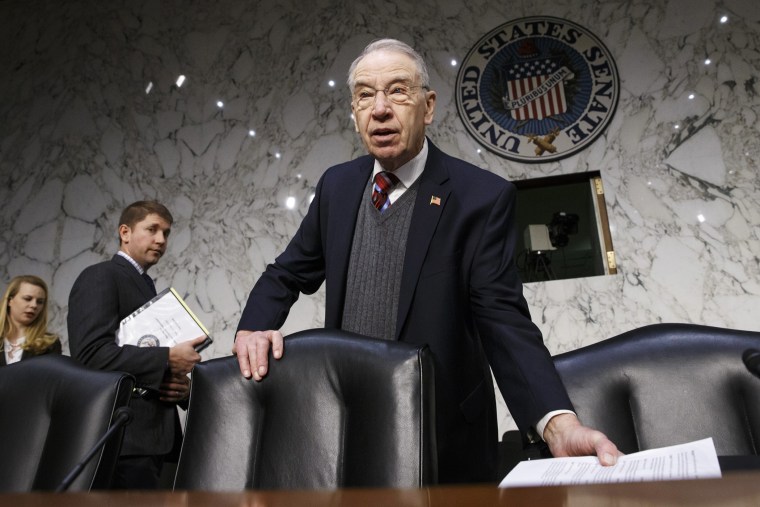Almost immediately after Supreme Court Justice Antonin Scalia's death was announced, Sen. Chuck Grassley (R-Iowa) claimed in a written statement that it's been "standard practice over the last 80 years to not confirm Supreme Court nominees during a presidential election year." The Iowa Republican insisted this is a "fact."
Grassley, in turns out, was completely wrong. There is no such "standard practice." Not only have several justices been confirmed in presidential election years, but in one instance, Grassley personally voted for one of them.
If it were just some random Republican member of Congress getting confused about the details, that'd be disappointing, but in this case, the circumstances were more alarming: Grassley is the chairman of the Senate Judiciary Committee. Once President Obama chooses a high court nominee, that nominee will automatically be referred to the Iowa Republican's panel. If the senator is part of the knee-jerk blockade, it will have a direct impact on the process.
With this in mind, it was of great interest to see Grassley hedge, at least a little, on the broader controversy, inching away from the hardline position the longtime GOP senator took over the weekend. The New York Times reported this afternoon:
Senator Charles E. Grassley, Republican of Iowa and chairman of the Senate Judiciary Committee, said Tuesday that he had not ruled out holding hearings on President Obama's eventual nominee to replace Justice Antonin Scalia on the Supreme Court. "I would wait until the nominee is made before I would make any decisions," Mr. Grassley said, according to Radio Iowa.
This isn't what the Iowan said over the weekend, and it opens the door, at least a little, to possible progress.
What's more, note that Grassley isn't the only Republican who seems uncertain about the GOP's radical call for unyielding obstructionism.
* Sen. Thom Tillis (R-N.C.), who said over the weekend that President Obama should not nominate the next Supreme Court justice, added today, "I think we fall into the trap if just simply say sight unseen, we fall into the trap of being obstructionists."
* Sen. Susan Collins (R-Maine), at least for now, has balked at joining her party's blockade. She said in a statement, "Our role in the Senate is to evaluate the nominee's temperament, intellect, experience, integrity and respect for the Constitution and the rule of law." Collins said nothing about refusing to consider a nominee from this president.
* Former Attorney General Alberto Gonzales, who served in the Bush/Cheney administration, believes the process should work as designed. "From my perspective having worked at the White House and then at the Department of Justice, there's just no question in my mind that as president of the United States, you have an obligation to fill a vacancy," Gonzales told CNN yesterday. "I suspect that President Obama is going to do his job, and after he does his job in nominating hopefully a qualified individual, the Senate will do its job, eventually, on its own calendar."
* Former RNC Chairman Michael Steele told MSNBC's Andrea Mitchell this afternoon that his fellow Republicans were making a "political misstep." Steele added, "It's going to be a tight squeeze for the Republicans, I think, on this issue. Barack Obama will find the upper hand."
* Even GOP presidential hopeful Ben Carson conceded that if there were a Republican White House and Republican Congress currently in place, GOP policymakers would act to fill the Supreme Court vacancy, rather than wait until after the election. Asked if his Republican brethren would postpone the confirmation process a year if they were in power, Carson confessed, "No, they wouldn't."
It's important to realize, of course, that for sitting Republican senators, especially Grassley and Tillis, today's more responsible rhetoric may be more about posturing than policy. GOP senators, en masse, hurried to join a partisan blockade over the weekend, but it probably dawned on them soon after this was a strategic error that left the party in an unsustainable position.
It's heartening to hear Grassley, in particular, adopt a more mature tone, but it's entirely possible that "I would wait until the nominee is made before I would make any decisions" is a subtle way of saying, "I'm going to keep up appearances before putting my party's interests about the nation's needs."
Nevertheless, many Democrats -- on both ends of Pennsylvania Avenue -- are moving forward with the hope that the weekend's tantrum was temporary, and Senate Republicans would find it difficult, if not impossible, to maintain an 11-month blockade on a qualified Supreme Court nominee.
Some of the rhetorical shifts and intra-party criticism will only encourage the White House and its allies to follow the nomination process as it's supposed to proceed, as if adults are still in positions of authority on Capitol Hill and cooler heads will eventually prevail.
* Update: It looks like we can add Sen. Ron Johnson (R-Wis.) to the list of Senate Republicans who quickly announced their opposition over the weekend to any possible nominee, only to slowly walk that back.
